#j. neil c. garcia
Explore tagged Tumblr posts
Text
Filipino poet and feminist critic Lilia Quindoza Santiago has pointed out that the word for grammatical gender in the Philippines is kasarian, and already it semantically affords a little more flexibility than its Western counterpart, which is clearly and hopelessly bifurcated. Sari, repeated in Tagalog-Filipino, is sari-sari, or "all and sundry". Thus, there may well be a kind of diversity to gender that may be allowed by certain if not most cultures in the Philippines.
J. Neil C. Garcia, Performing the Self: Occasional Prose
#something about this makes me so happy#though it's a tagalog-filipino word so now i wonder what is the word for gender in other dialects in the ph#gender#queer#philippine literature#j. neil c. garcia
257 notes
·
View notes
Text
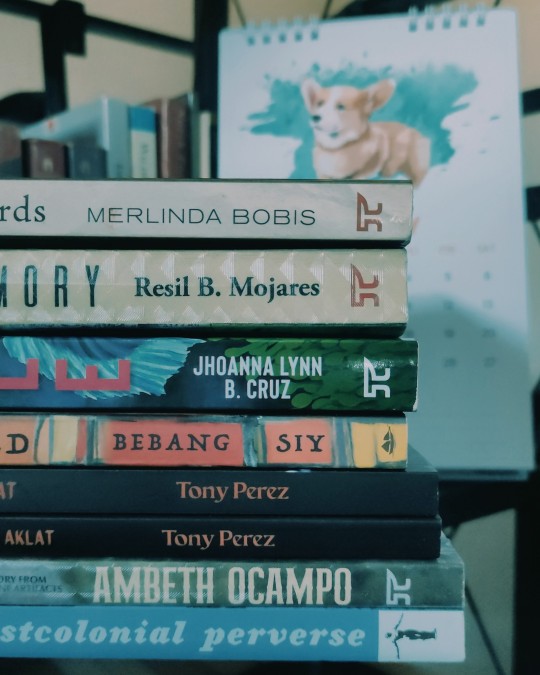


Some Filipino-written books that I want to finish within the first half of the year.
#libro#philippine literature#merlinda bobis#resil mojares#ambeth ocampo#tony perez#jhoanna lynn cruz#bebang siy#j. neil c. garcia
29 notes
·
View notes
Text
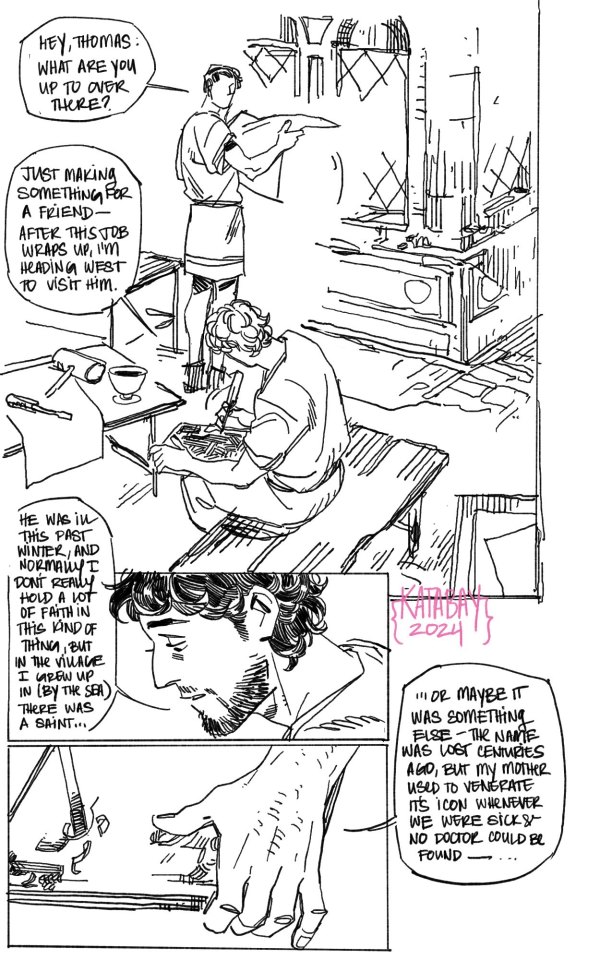
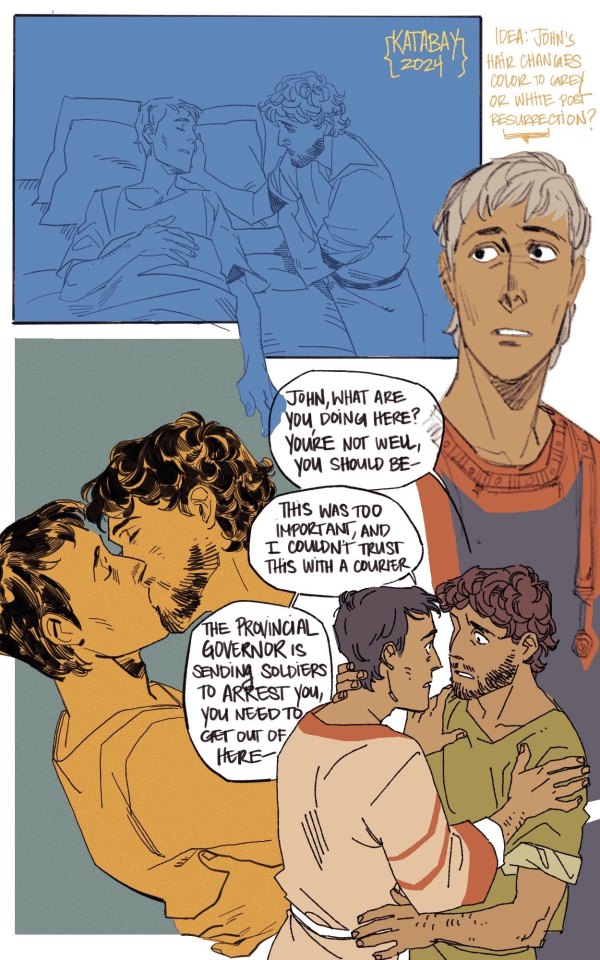
THEY SAY THERE IS A CARPENTER FROM THE PROVINCE PERFORMING MIRACLES IN THE CAPITAL
another scene and some sketches of the fake byzantine empire ocs! thomas is a carpenter, john is a merchant. there's an emperor (two, actually) in here, looming ominously over everything.
(I call it the fake byzantine empire because the setting is playing with byzantine history that spans across three centuries, but it's also pulling from things like Statius' Thebaid and later medieval literature. folk catholic horror, probably. doctrinal debates and schisms are in here)
on the topic of nameless and unknown saints, tho, sometimes I think about this excerpt from an essay in Closet Queeries and the time I was on my way to Tanjay and saw an abandoned chapel along a road with a statue of a saint I didn't recognize inside

Closet Queeries, essays by J. Neil C. Garcia
⭐ places I’m at! bsky / pixiv / pillowfort /cohost / cara.app / tip jar!
#emphasizing the byzantine empire part lest someone call this bible fan art like what century do you think these things take#place in. come on#i will say there IS gospel narrative inspiration/parallels occurring in the story but it's NOT a 1-1 retelling in the slightest#we diverge heavily right before the pasyon arc because i have other shit i want to do#original tag#komiks tag#the carpenter & the merchant#ANYWAY i was visiting family in the ICU today so you will have to suffer my handwriting bc i simply do not feel like doing digital#lettering
212 notes
·
View notes
Text
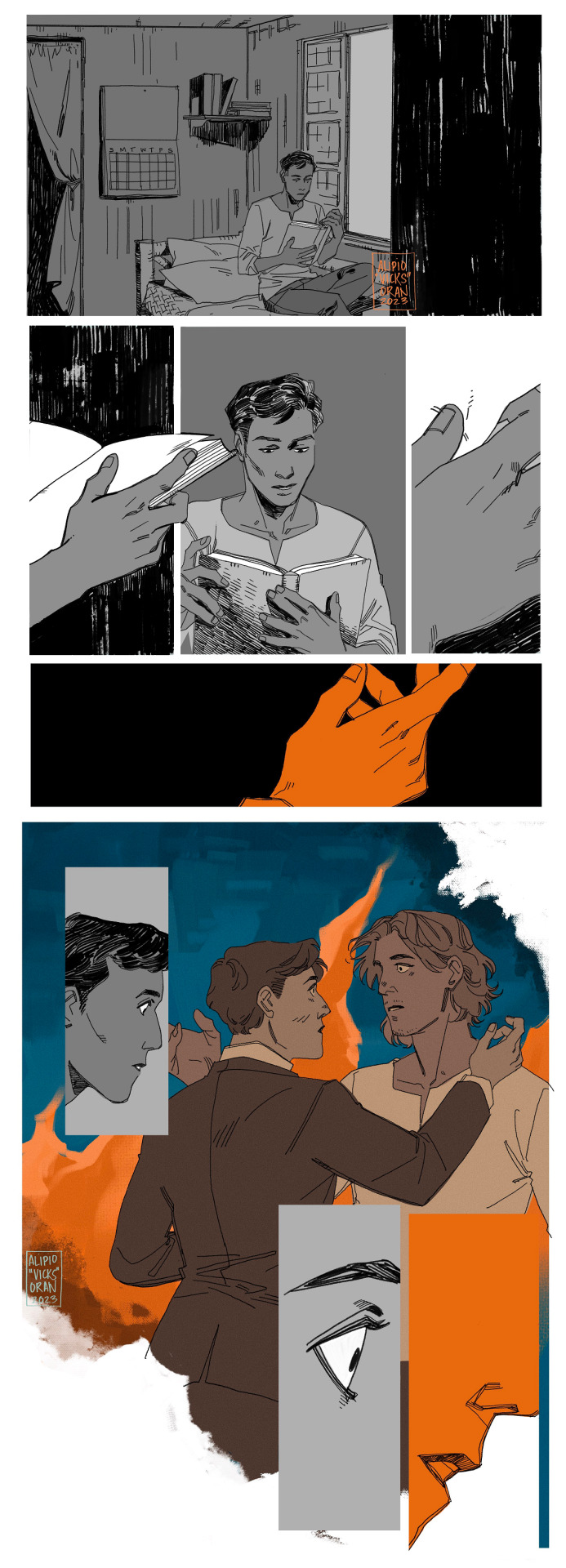
SPARK
this is. about the dialogue between Bonifacio and Rizal, the impact that one had on the other, the way Rizal's novels could spark desire for freedom like a wildfire that will not be tamed. there's an element of 'I would have gone through life half asleep if I never met you,' to it. the linked tragedies, the characters from the novels themselves seem to echo forward onto Bonifacio and Rizal in their own way as well.

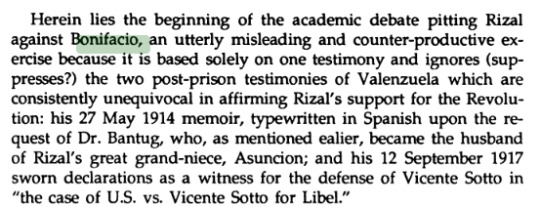
Rizal and the Revolution, Floro Quibuyen


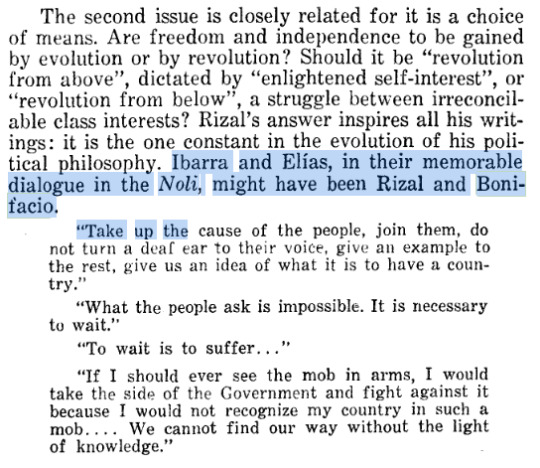
The First Filipino, Leon Ma. Guerrero


Closet Queeries, J. Neil C. Garcia
additionally! the illustrated panel of Ibarra and Elias! it's a combination of a few things; them in Noli, but it's combining the character trajectory Ibarra/Simoun has gone on with El Filibusterismo (hence. the flames. dude said I came here to burn shit to the ground, and damn, it was a speech.) like. do you see the similarities between Bonifacio and Rizal in this because I cannot stop thinking about it.

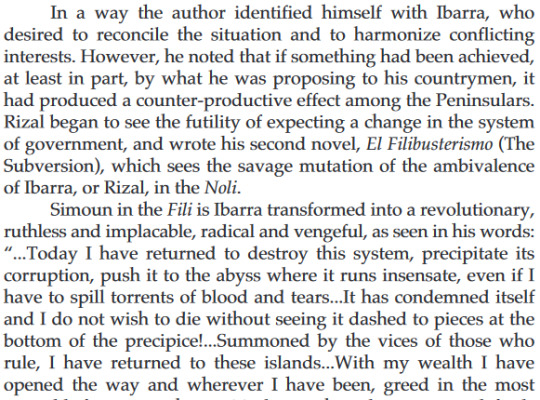
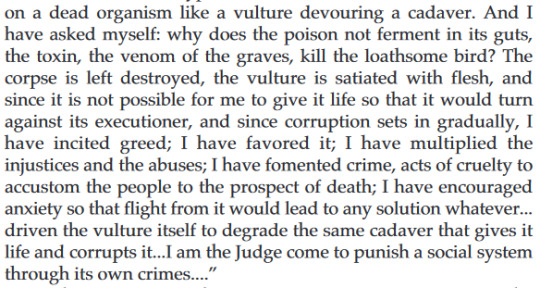
Introduction to Ma. Soledad Lacson-Locsin's translation of Jose Rizal's El Filibusterismo
🍊 twitter 🍊 pixiv 🍊 bsky
#komiks tag#andres bonifacio#jose rizal#art tag#colonial era ph#philippine history#SCREAMING these citations are as long as the comic itself#also a bonus. bit of visual commentary. the red/white of the last panel is supposed to be a call forward to the katipunan flag (red/white)#colors. its that recognition of self through the other baby!! (its an orange-ish red but thats bc the actual red did Not look good against#the other colors i had. RIP)
272 notes
·
View notes
Text
dropping my complete tbr below (over 100 novels) bc i neeeed someone to tell me what book to read next. reading strange sally diamond rn and it's too draining and cruel to continue atm. pls help me pick my next read ill love u forever!!!
specifically need a break from sally diamond's themes (csa, r***, p********a, on screen torture). my next read can still be disturbing in any other way that isn't the mentioned triggers idm
my current tbr:
a botanical daughter (noah medlock)
a sweet sting of salt (rose sutherland)
all's well (mona awad)
bad cree (jessica johns)
biography of x (catherine lacy)
birnam wood (eleanor catton)
black sheep (rachel harrison)
bridge (lauren beukes)
brutes (dizz tate)
cackle (rachel harrison)
carnality (lina wolff)
comfort me with apples (catherynne m valente)
dead eleven (jimmy juliano)
death valley (melissa broder)
diavola (jennifer thorne)
episode thirteen (craig dilouie)
goddess of filth (v castro)
her little flowers (shannon morgan)
home is where the bodies are (jeneva rose)
homecoming (kate morton) i think this one may be a bit too long for me rn
house of hollow (krystal sutherland)
how to solve your own murder (kristen perrin)
i cheerfully refuse (leif enger)
i keep my exoskeletons to myself (marisa crane)
in my dreams i hold a knife (ashley winstead)
jawbone (monica ojeda)
knock knock open wide (neil sharpson)
lapvona (ottessa moshfegh)
leech (hiron ennes)
lone women (victor lavalle)
looking glass sound (catriona ward)
midnight is the darkest hour (ashley winstead)
mirrorland (carole johnstone)
mister magic (kiersten white)
monstrilio (gerardo samano cordova)
mother thing (ainslie hogarth)
my murder (katie williams)
natural beauty (ling ling huang)
near the bone (christina henry)
no one's home (d m pulley)
notes on an execution (danya kukafka) probably not for my next read LMAO
penance (eliza clark)
revelator (daryl gregory)
ripe (sarah rose etter)
silver nitrate (silvia moreno garcia)
sisters of the lost nation (nick medina)
the burning girls (c j tudor)
the centre (ayesha manazir siddiqi)
the death of jane lawrence (caitlin starling)
the haunting of velkwood (gwendolyn kiste)
the husbands (holly gramazio)
the last murder at the end of the world (stuart turton) even tho stuarts novels hurt my head
the last house of the flower bride (roshani chokshi)
the missing years (lexie elliott)
the other valley (scott alexander howard)
the return (rachel harrison)
the skeleton key (erin kelly)
these fleeting shadows (kate alice marshall)
things in jars (jess kidd)
this thing between us (gus moreno)
tripping arcadia (kit mayquist)
unsettled ground (claire fuller)
wrong place wrong time (gillian mcallister)
#booklr#bookblr#tbr list#reading#horror literature#horror novel#thriller novel#??? idk anything abt booklr :(
2 notes
·
View notes
Text
tumblrinas would go crazy over j neil c garcia's poetry
4 notes
·
View notes
Text
Five Literary Theories from Philippine Authors
Literature is the mirror through which we can see the world and ourselves." - F. Sionil Jose Literary theories play a crucial role in our understanding and interpretation of literature. They provide us with tools and frameworks to analyze and appreciate the complexities of literary works. In the Philippines, there are several literary theories developed by Filipino authors that shed light on the unique perspectives and experiences of the Filipino people. In this blog post, we will explore five literary theories from Philippine authors that offer valuable insights into the rich literary landscape of the country. 1. Cultural Studies: Cultural studies, as proposed by Filipino theorist Nicanor Tiongson, emphasizes the importance of understanding literature within its socio-cultural context. It recognizes that literature is not created in a vacuum but is shaped by the historical, social, and cultural forces of a particular community. By examining the cultural elements embedded in literary texts, we gain a deeper understanding of the Filipino identity and the issues that resonate within the society. 2. Postcolonial Theory: Postcolonial theory, influenced by the works of Filipino scholars such as Renato Constantino and Epifanio San Juan Jr., examines the effects of colonialism on literature and culture. It challenges the dominant Western narratives and seeks to uncover the voices and experiences of the colonized. Through postcolonial theory, we can analyze how Philippine literature reflects the struggles, resistance, and resilience of the Filipino people in the face of colonization. 3. Feminist Criticism: Feminist criticism, championed by Filipino writers like Soledad Reyes and Judy Taguiwalo, focuses on the representation of women in literature and challenges patriarchal norms and stereotypes. It explores the power dynamics, gender roles, and social constructs that shape female characters and their experiences. By applying feminist criticism, we can uncover the hidden narratives of women in Philippine literature and promote gender equality and empowerment. 4. Queer Theory: Queer theory, influenced by the works of Jose Neil Garcia and J. Neil C. Garcia, examines the representation of non-normative sexualities and gender identities in literature. It challenges heteronormative assumptions and explores the complexities of queer experiences. Through queer theory, we can analyze how Philippine literature portrays LGBTQ+ individuals and their struggles for acceptance and self-expression. 5. Indigenous Literary Theory: Indigenous literary theory, developed by Filipino scholars like Rosario Cruz-Lucero and Maria Josephine Barrios, focuses on the narratives and oral traditions of indigenous communities in the Philippines. It recognizes the importance of indigenous knowledge, cultural practices, and storytelling in shaping literary works. By engaging with indigenous literary theory, we can appreciate the diverse cultural heritage of the Philippines and amplify the voices of marginalized indigenous communities. These five literary theories from Philippine authors provide us with valuable tools to analyze and appreciate Philippine literature. They offer unique perspectives and insights into the Filipino experience, challenging dominant narratives and promoting inclusivity and diversity. By engaging with these theories, we can deepen our understanding of Philippine literature and contribute to the ongoing dialogue about the power and significance of literature in our society.
1 note
·
View note
Photo

J. Neil Garcia, Gift, 2
364 notes
·
View notes
Text

J. Neil C. Garcia, from “Gift, 2,” in BUDHI: A Journal of Ideas and Culture Vol. 3, No. 1 (1999)
#philippine literature#filipino literature#j. neil c. garcia#poetry excerpt#love#sea#quote#lliterature#poem#budhi: a journal of ideas and culture#fragility#mortality#destruction#entropy#*
45 notes
·
View notes
Quote
It happened in a metal drum. They put me there, my family That loved me. The water Had been saved just for it, that day. The laundry lay caked and smelly In the flower-shaped basins. Dishes soiled with fat and swill Pilled high in the sink, and grew flies. My cousins did not get washed that morning. Lost in masks of snot and dust, Their faces looked tired and resigned To the dirty lot of children. All the neighbors gathered around our open-aired bathroom. Wives peered out from the upper floor of their houses into our yard. Father had arrived booming with cousins, my uncles. They were big, strong men, my uncles. They turned the house inside-out Looking for me. Curled up in the deepest corner Of my dead mother’s cabinet, father found me. He dragged me down the stairs by the hair Into the waiting arms of my uncles. Because of modesty, I merely screamed and cried. Their hands, swollen and black with hair, bore me Up in the air, and touched me. Into the cold Of the drum I slipped, the tingling Too much to bear at times my knees Felt like they had turned into water. Waves swirled up and down around me, my head Bobbing up and down. Father kept booming, Girl or boy. I thought about it and squealed, Girl. Water curled under my nose. When I rose the same two words from father. The same girl kept sinking deeper, Breathing deeper in the churning void. In the end I had to say what they all Wanted me to say. I had to bring down this diversion To its happy end, if only for the pot of rice Left burning in the kitchen. I had to stop Wearing my dead mother’s clothes. In the mirror I watched the holes on my ears grow smaller, Until they looked as if they had never heard Of rhinestones, nor felt their glassy weight. I should feel happy that I’m now Redeemed. And I do. Father died within five years I got my wife pregnant with the next. Our four children, all boys, Are the joy of my manhood, my proof. Cousins who never shed their masks Play them for all their snot and grime. Another child is on the way. I have stopped caring what it will be. Water is still a problem and the drum Is still there, deep and rusty. The bathroom has been roofed over with plastic. Scrubbed and clean, my wife knows I like things. She follows, though sometimes a pighead she is. It does not hurt to show who is the man. A woman needs some talking sense into. If not, I hit her in the mouth to learn her. Every time, swill drips from her shredded lips. I drink with my uncles who all agree. They should because tonight I own their souls And the bottles they nuzzle like their prides. While they boom and boom flies whirr Over their heads that grew them. Though nobody Remembers, I sometimes think of the girl Who drowned somewhere in a dream many dreams ago. I see her at night with bubbles Springing like flowers from her nose. She is dying and before she sinks I try to touch Her open face. But the water learns To heal itself and closes around her like a wound. I should feel sorry but I drown myself in gin before I can. Better off dead, I say to myself And my family that loves me for my bitter breath. We die to rise to a better life.
"The Conversion" by J. Neil C. Garcia
#idk i just wanna keep this somewherr and also share this beautiful piece somehow#philippine literature#J. Neil C. Garcia#J. Neil Garcia#gay literature
2 notes
·
View notes
Text
Sakin nagtatagpo ang mga mata at pananabik, at kung matapos mo na buklatin ang buong uniberso nandito lamang ako sakaling ibigin mong balikan.
Emmanuel T. Barrameda, mula sa "Flyleaf" sa Isang B'wan
I am not ashamed to admit it: I love you the way water loves. Which is to say I wish the world were through with you, so you could return to me ravaged, upon this shore:
J. Neil C. Garcia, from “Gift,2” (Published in Budhi)
522 notes
·
View notes
Text
I love the Filipino Language
Filipino poet and feminist critic Lilia Quindoza Santiago has pointed out that the word for grammatical gender in the Philippines is kasarian, and already it semantically affords a little more flexibility than its Western counterpart, which is clearly and hopelessly bifurcated. Sari, repeated in Tagalog-Filipino, is sari-sari, or "all and sundry". Thus, there may well be a kind of diversity to gender that may be allowed by certain if not most cultures in the Philippines.
J. Neil C. Garcia, Performing the Self: Occasional Prose
257 notes
·
View notes
Text
Lost in the sea’s unforgiving blue, I seek you. Before me the day unscrolls its naked scripture: sun, vision’s burning field, islands, faint presences crumbling in the distance, water, the fickle immensities life is made constant by. And it strikes me I love the sea because it borders this suffering world and the next: the soul, it is said, travels in a boat from a winding inland river, homing clear-eyed toward the ocean-- which is the bottomless beyond. And I know: here, upon this beach, wash the crushed remains of what was once mortal: bone and kelp, driftwood and tentacle, porous red coral-- keepsakes life leaves behind before dissolving back to brine. I am home here, then, whom the world never loved, and from its torn edges I can almost see it all end: an onrushing tide, a radiant sea-swell sweeping away all appearance, gentle eddies whittling the self till it is no longer even sand. I think of you landlocked and lost in another element-- your body. The sea teaches me love is a wish not for safety but for destruction. I am not ashamed to admit it: I love you the way water loves. Which is to say I wish the world were through with you, so you could return to me ravaged, upon this shore: a shell held tight inside my palm.
J. Neil C. Garcia, "Gift, 2"
33 notes
·
View notes
Text
Before me the door quivers like a butterfly. I will burst it apart, it will fly from its hinges, redeemed. Outside, I will open all things and sing. Doors, shaken and shocked shall slam on my wings.
J. Neil C. Garcia, from "Closet Quivers"
13 notes
·
View notes

